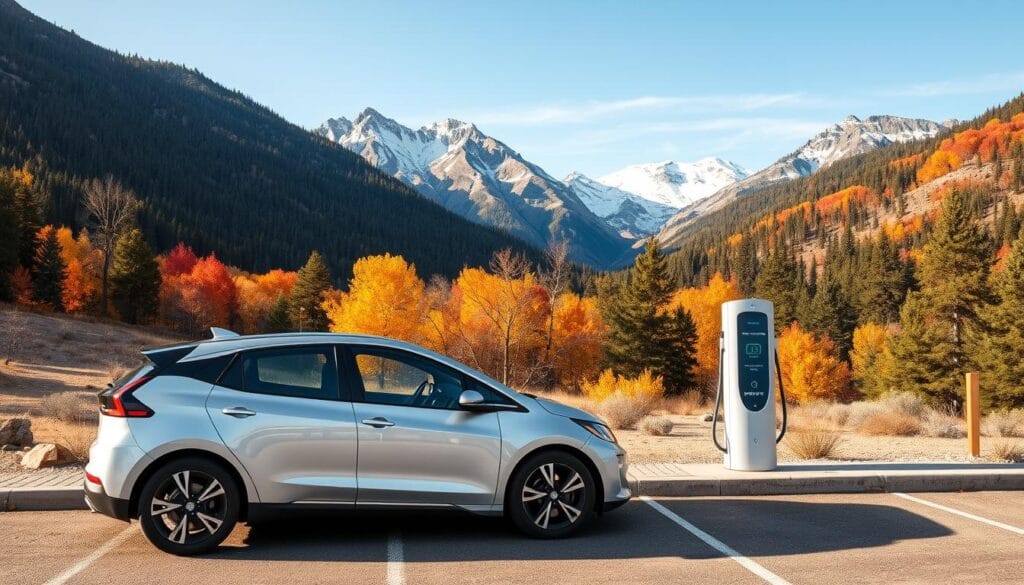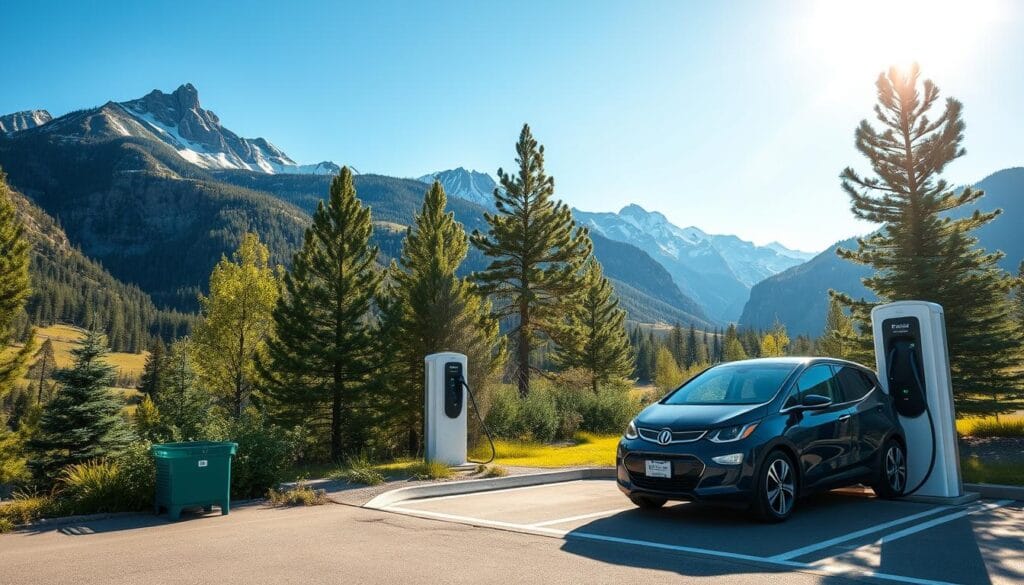Colorado is leading the way in eco-friendly transportation with big incentives. The state’s electric vehicle tax credit is a great chance for residents to go green. It offers big savings for those choosing electric cars.
The state’s tax credit for electric vehicles makes switching to electric easy and attractive. There are big savings on tax credits and rebates for home charging units. Colorado is at the forefront of the electric car movement in the US.
Key Takeaways
- The Colorado electric vehicle tax credit can net residents up to $7,500 in savings when purchasing or leasing new EVs or PHEVs.
- Colorado leads in the green movement, with over 14% of new vehicle registrations in 2023 being EVs.
- A state tax credit of $5,000 is available for EVs with an MSRP under $80,000 and an extra $2,500 for those under $35,000.
- Utility providers in Colorado, such as Black Hills Energy and Xcel Energy, offer rebate programs to further subsidize EV ownership costs.
- Colorado residents are incentivized to install Level 2 EV chargers at home with rebates adding up to over $1,000.
- The state also provides significant incentives for heavy-duty electric vehicles and charging stations to encourage commercial use of EVs.
- Colorado exempts fully electric vehicles from state motor vehicle emissions inspections, enhancing their appeal.
Understanding the Colorado Electric Vehicle Tax Credit
Many Coloradans are interested in electric vehicles. The electric vehicle tax credit Colorado is key to understanding these incentives. It supports the environment and offers financial benefits to those who qualify. We’ll cover who can get the credit, how much you can save, and how the car’s price affects your savings.
Eligibility Criteria for Colorado EV Tax Credit
The Colorado electric car tax credit aims to make electric vehicles more affordable. To qualify, you must buy or lease a new vehicle in Colorado. Both personal and commercial vehicles are eligible if they meet the state’s electric vehicle standards.
The Colorado EV incentive program helps many people. It encourages a shift towards greener transportation options.
How Much Can You Save with the Colorado EV Tax Credit?
The electric vehicle tax credit Colorado offers big savings. You can get a tax credit of up to $5,000 for a new EV. This applies if you lease the vehicle for at least two years.
For EVs priced under $35,000, you might get an extra $2,500 credit. This makes more affordable electric vehicles even more attractive, encouraging more people to switch.
The Impact of MSRP on Your Tax Credit
The Colorado electric vehicle rebate amount depends on the car’s MSRP. Cars with lower prices get bigger tax credits. This means more people can benefit from the program, regardless of their income.
Learn more about the costimplications and benefits of different EV charging. See how these can help you save even more with Colorado’s EV incentives.
Maximizing Your Savings: Tips for Claiming Colorado EV Incentives
Knowing how to claim EV tax credit in Colorado is key for those buying electric cars. This guide shows how to use state and utility incentives easily.
The Process of Claiming Electric Vehicle Tax Credit in Colorado
In Colorado, the Colorado electric car tax credit makes buying EVs more affordable. This credit can be used at the point of sale, reducing the cost. If you’re eligible, you’ll see the credit applied directly to the purchase price.
For example, buying a new Chevy Bolt or Hyundai KONA Electric can be cheaper. Prices could drop to around $26,500 and $25,175 after applying the tax credit.
Documentation Needed for Tax Credit
To claim the Colorado electric car tax credit, you need the right documents. Talk to local dealerships or tax experts to get the paperwork right. This includes proof of residence, vehicle registration, and purchase proof.
Also, there are rebates for electric vehicle charging setups. For instance, Xcel Energy offers rebates for Level 2 and Level 3 chargers. This supports Colorado’s growing EV adoption.
For Colorado residents, using these incentives can save a lot. You could save up to $21,000 with the right programs. These savings make electric cars more affordable and help Colorado go green.
Latest Updates on Electric Vehicle Tax Credit Colorado for 2024
Colorado is making big changes for electric vehicle incentives in 2024. These updates could make electric cars more affordable and appealing. The Colorado electric vehicle tax incentive has been key, and new rules aim to make EVs even more affordable.
The electric vehicle tax credit colorado 2021 now requires critical minerals and battery components for the credit. This change supports domestic supply chains and reduces foreign reliance. Starting in 2024, dealerships can offer these tax benefits directly at the point of sale for new and used EVs.
This change is expected to increase EV sales. It supports Colorado’s goal of more clean vehicles. Here’s a detailed look at how these changes could save consumers money:
| EV Model | Refreshed MSRP | Potential Cost After Incentives |
|---|---|---|
| Tesla Model Y | $44,000 | $23,000 |
| Tesla Model 3 | $35,000 | $14,000 |
| Chevy Bolt EUV | $27,800 | $6,800 |
| Chevy Bolt EV | $26,500 | $5,500 |
The Colorado clean energy vehicle tax credit and federal incentives make EVs more affordable. They show Colorado’s commitment to sustainable transport. These incentives are crucial for a future with more clean energy vehicles.
It’s important to keep up with these updates. Local dealerships will offer these incentives directly, changing how we buy cars in Colorado.
Colorado’s EV Tax Credit Versus Federal Incentive Programs
Colorado is leading the way in electric vehicle incentives. The state’s efforts, combined with federal programs, make electric cars more affordable. Let’s explore how these incentives work together to save you money.
Differences Between State and Federal EV Tax Credits
The federal electric vehicle tax credit can give you up to $7,500 back. But, it has rules about where the car was made and is available everywhere. Colorado’s state tax credit for electric vehicles is different, offering up to $5,000 for locals only. It’s the biggest state incentive in the U.S.
Colorado’s credit is refundable, meaning you get the full amount back. This helps make electric cars more affordable for everyone.
How to Combine Colorado and Federal EV Incentives for Maximum Benefit
Colorado residents can save a lot by using both the state and federal credits. By combining these, you can cut down the cost of buying or leasing an electric car. This makes electric vehicles a more affordable choice than gas cars.
To get the most savings, you need to know the rules for both credits. This way, you can take full advantage of these financial benefits.
| Feature | Colorado State Credit | Federal Tax Credit |
|---|---|---|
| Maximum Credit Amount | $5,000 | $7,500 |
| Eligibility Requirement | Colorado residency | Vehicle meets U.S. production specifications |
| Refundable | Yes | Varies based on individual tax liability |
To make the most of these benefits, you need to understand the rules from Colorado and the federal government. These rules can change, so staying updated is important. Colorado aims to make it easier to get these discounts by 2025.
In conclusion, using these incentives wisely can save you money right away. It also helps Colorado reach its goal of 940,000 electric vehicles by 2030. This is a big step towards a greener future.
Electric Vehicle Lease Agreements and Colorado Tax Credit Eligibility
Colorado is seeing a big rise in electric vehicles (EVs). This is thanks to many incentives for greener cars. The colorado ev incentive and ev lease incentives colorado are key for those leasing instead of buying.
In April, 40% of EVs were leased. This shows a big trend towards leasing. It matches with Colorado’s state benefits for clean cars.
The Role of Lease Term in Securing EV Tax Credits
The lease term is very important for EV tax credits in Colorado. To get the colorado green vehicle tax credit, leases must last at least two years. This shows Colorado’s commitment to sustainable transport.
At the federal level, there’s also a push for sustainability. Lessees with certain incomes can get up to $7,500 in federal tax credits. This can add up to $12,500 with state and federal credits together. This makes EVs more affordable and attractive.
To claim the tax credit in Colorado, you need to file Form DR 0617 with the state. It’s important for lessees and financing companies to follow these rules. This ensures the benefits for a greener Colorado are given out right.
Knowing these details can save a lot of money. It also helps Colorado become more environmentally friendly. Talking to a tax expert or checking out AutoNation USA can help understand these benefits better.
List of Qualified Electric Vehicles for Colorado EV Tax Credit
In Colorado, buying an electric vehicle comes with a bonus. The state offers a tax credit for clean energy vehicles. This makes switching to electric cars cheaper.
Electric Vehicles Under the $80,000 MSRP Cap
The tax credit in Colorado is $5,000 for new electric and plug-in hybrid cars. These must cost $80,000 or less. This rule makes many cars eligible, helping the environment and meeting different needs.
To see which cars qualify, visit Colorado’s electric vehicle incentives. With savings up to $21,000, electric cars are getting more affordable.
Understanding the Classification Changes to Eligible EVs
Colorado updates its EV list every year. This keeps the tax credit effective for low-emission cars. For more on EVs, check out how electric cars work.
| EV Model | MSRP | State Tax Credit |
|---|---|---|
| Tesla Model 3 Standard Range | $44,990 | $5,000 |
| Chevrolet Bolt EV | $31,500 | $5,000 |
| Ford Mustang Mach-E | $43,895 | $5,000 |
| Hyundai Kona Electric | $34,000 | $5,000 |
Colorado’s EV tax credit is dynamic and refundable. This makes it a great place for electric car owners. The state’s programs offer savings and help the environment.
Colorado Electric Vehicle Charging Rebate Programs
Colorado is working hard to make electric vehicles more popular. It has set up programs to help with the cost of EV charging stations. These programs help both homeowners and businesses, making it easier to use electric cars.
Incentives for Home Charging Stations
Colorado has a big incentive for people to get home charging stations. This helps make electric cars more affordable and easy to use every day. For example, you can get a tax credit of up to $1,000 for a Level 2 charging system.
Commercial EV Charging Station Tax Credits
Businesses in Colorado can also get help for installing EV charging stations. This makes it easier for companies to support electric cars. For example, Black Hills Energy offers up to $2,000 per port for Level 2 chargers at businesses.
| Utility Company | Level 2 Rebates | Additional Support |
|---|---|---|
| Poudre Valley REA | Up to $250 or 50% | Both private and public use installations supported |
| Empire Electric Assoc. | Up to $1,000 or 50% for Level 2 | Up to $4,000 or 50% for Level 3 chargers |
| Sangre de Cristo Electric Assoc. | Up to $1,000 for managed chargers | Up to $7,500 for DCFC chargers depending on kW rating |
| Efficiency Works | Based on number of points and networking capabilities | Support for publicly accessible chargers |
Colorado is leading the way in making electric vehicles more accessible. With state and local help, it’s making it easier to use electric cars. This is helping create a greener future for everyone.
Income Caps and Limitations for Colorado Electric Vehicle Tax Credit
It’s important to know the income limits for tax savings on electric vehicles in Colorado. The state has set income caps. This is to make sure the clean energy vehicle tax credit goes to those who need it most.
How Income Affects Your Eligibility for EV Tax Credit
In Colorado, who gets the electric vehicle tax incentives depends on income. The state wants to help those who can’t afford it the most. The income limits are $150,000 for singles, $225,000 for heads of household, and $300,000 for couples.
Transferring the Lease Credit to Reduce Costs
Leasing an electric vehicle? Knowing how to transfer the lease credit can save you money. Leasing companies usually keep the credit. But, you can still get a lower monthly cost by following the right steps.
Here’s a table showing rebate amounts for different income levels and e-bike types. It shows how these incentives are designed to help:
| E-Bike Type | Low-Income Rebate ($) | Moderate-Income Rebate ($) | Maximum Purchase Price ($) |
|---|---|---|---|
| Standard E-Bike | 1,100 | 500 | 5,000 |
| E-Cargo Bike | 1,400 | 800 | 8,500 |
| Adaptive E-Bike | 1,350 | 750 | 8,500 |
This way, tax incentives for electric cars in Colorado help people from all income levels. They can use clean transportation.
Conclusion
Colorado is leading the way in eco-friendly transportation with strong incentives for electric cars. The state’s tax credit for electric vehicles has gone up from $5,000 to $7,500 starting in January 2024. This change helps more people switch to electric cars.
The Colorado Inflation Reduction Act of 2022 also offers a federal tax credit. This credit can save up to $12,500 for certain vehicles. These benefits show Colorado’s dedication to green transportation.
Changes like keeping rebates competitive and separating Xcel Energy’s rebate from the state tax credit show Colorado’s commitment. Those who qualify for social programs or meet income requirements can get even more savings. These tax credits make Colorado a top choice for EV buyers.
Eligible buyers can save up to $12,500 on electric cars and nearly $20,000 on electric trucks. Colorado is also offering a tax break for E-Bike purchases and rebates for EVs and charging stations. These steps show Colorado’s effort to make transportation greener.
These moves make Colorado a leader in electric vehicle adoption. They offer financial benefits and support sustainable growth. Colorado is at the forefront of green transportation, leading the way for others to follow.










